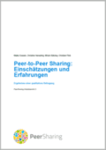Peer-to-peer sharing: assessments and experiences
Abstract
The project "PeerSharing" investigates the socio-ecological effects and sustainability potentials of peer-to-peer sharing in Germany. As part of a qualitative-explorative preliminary study, "experienced" and "inexperienced" people were interviewed by telephone about their assessments, experiences and usage intentions regarding peer-to-peer sharing. The study group included 16 users of the cooperating platforms Wimdu, Drivy, flinc and Kleiderkreisel as well as 16 people without experience with peer-to-peer sharing. The findings make clear that the interviewees are generally familiar with the concept of the "sharing economy" and have a positive attitude towards peer-to-peer sharing in particular. Furthermore, the majority of the interviewees assume positive ecological as well as social effects. Resource conservation and contact with people or social interaction and exchange are the most frequently expected consequences in this context. The main motive of most interviewees for the (potential) use of peer-to-peer sharing is financial. Ecological motives play a rather subordinate role for the actual use, although positive environmental effects are expected as a consequence of peer-to-peer sharing and current consumption problems are partly reflected. The results of the preliminary study prove the great social acceptance of peer-to-peer sharing. They serve as a basis for the conception of a representative survey on the use and perception of peer-to-peer sharing in Germany as well as a comprehensive survey of users of Wimdu, Drivy, flinc and Kleiderkreisel.
